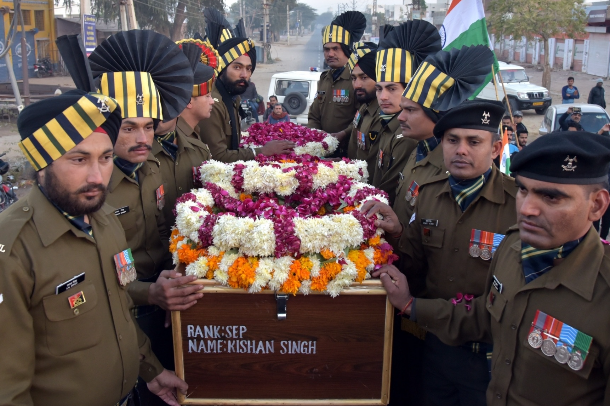
Security personnel pay tribute to soldier Sowar Kishan Singh, who was killed in a gunfight with militants in Sirnoo village in Jammu and Kashmir’s Pulwama district on Dec 15. (Photo by IANS)
Umar Manzoor Shah, Srinagar, India
December 21, 2018
Armed conflict in India’s northern Jammu and Kashmir state continues to claim hundreds of lives as the military attempts to crush Islamist secessionist militants.
The conflict between insurgents and the army has resulted in more than 400 deaths so far this year, according to government records.
Those killed in the Muslim-dominated region bordering Pakistan include 100 civilians, 82 army personnel and 240 militants.
Of the militants killed this year, 166 were killed after June 19, when the state came directly under the control of the federal government run by the pro-Hindu Bharatiya Janata Party (BJP).
The government claims that this year it has killed a record number of militants in line with its policy of toughening its response to the insurgency.
The army in 2016 launched ‘Operation all-out’ in Kashmir to flush out militants. The region witnessed six months’ of violent protests after the army shot dead militant leader Burhan Wani on July 8, 2016.
In 2016, 15 civilians, 82 security people and 150 militants were killed. In the following year, 213 militants were killed.
The administration, according to media reports, has vowed to continue the operation until “complete peace” is established in Jammu and Kashmir.
Records show killings also increased the last time a BJP-led coalition government was in power in New Delh, under Atal Bihari Vajpayee, who served as prime minister between 1998 and 2004.
During the five years to 2003, 7,820 militants were killed. In the same period, 2,055 security personnel and 4,519 civilians were died.

Kashmiri villagers watch during a funeral procession in Hajin, north of Srinagar on Dec. 10. Thousands of villagers joined the funeral of two rebels killed along with another rebel, in a gunfight with Indian troops outside the city of Srinagar. (Photo by Tauseef Mustafa/AFP)
On Dec. 15 this year, seven civilians were killed by security forces in south Kashmir’s Pulwama when they tried to march towards the encounter site where the army gunned down three militants.
The state’s former chief minister, Mehbooba Mufti, said political parties such as the BJP, used violence in Kashmir to gain votes during elections as “Muslim bashing” could placate the Hindu majority in India.
“Kashmir and India aren’t an issue in Pakistan during the elections,” said Mufti on Dec. 14.
“In India, unfortunately, politics is such that the tougher your stance towards Pakistan and Kashmir, the more votes you are expected to get,” he said.
“That is the problem.”
The separatists, who advocate Kashmir’s merger with Pakistan or outright independence, maintain that the Muslim majority region should have joined Pakistan when then British India was partitioned in 1947.
India claims Pakistan supports terrorism in Kashmir in a bid to take it over, but Pakistan has constistently denied the charge as being politically motivated.
Both countries partially control the region after more than 70 years of the dispute leading to three major wars and myriad skirmishes.
India’s effort to militarily address the issue would not work as most people in the region wanted freedom from India, said 89-year-old separatist leader Syed Ali Geelani.
“The army try to test their muscles and arsenal on peaceful protestors who are just demanding their basic and fundamental right to self-determination promised by their own leaders,” Geelani told ucanews.com.
He spearheaded 2016 agitation to pressure the United Nations to help resolve the issue by conducting a plebiscite.
Calls for dialogue have come from a range of community groups, not least Christian churches.
However, pre-conditions set by both nations have stymied efforts to convene bilateral talks.
The Indian-administered part of Kashmir has experienced increased violence since 1989 when militants stepped up armed resistance.
Rights groups estimate that 100,000 people have since been killed, but Indian official records put the number at closer to 47,000.
